- Home
- Joan Lowery Nixon
Secret, Silent Screams
Secret, Silent Screams Read online
Was it suicide—or homicide?
Marti squirmed on the bench, and Kim, who was squeezed tightly next to her, touched her arm. “Hang on” Kim whispered. “There's not much more he can say.”
But Kim was wrong. Mr. Billingsley suddenly raised his head with a look of relief, as though he'd been counting the seconds, and announced, “Many of you have heard of Dr. Clement Granberry, a nationally known psychologist who has written a number of best-selling self-help books. Dr. Granberry has become concerned with the rising number of teenage suicides across the United States and is gathering information for a book exploring the problem. He contacted me after learning through the news media about Barry Logan's suicide and graciously asked to speak to—”
Marti stumbled to her feet, shouting, “No! It's not true! It's a lie!”
Mr. Billingsley's mouth, pink and fleshy, hung limply open as he and Marti goggled at each other over a waving sea of hundreds of pairs of wide-open, shocked eyes. Marti clapped her hands to the sides of her head and screamed, “Barry didn't kill himself! He didn't! Barry was murdered!”
LAUREL-LEAF BOOKS BY JOAN LOWERY NIXON
THE HAUNTING
DON'T SCREAM
A CANDIDATE FOR MURDER
THE DARK AND DEADLY POOL
A DEADLY GAME OF MAGIC
THE GHOSTS OF NOW
THE ISLAND OF DANGEROUS DREAMS
THE KIDNAPPING OF CHRISTINA LATTIMORE
MURDERED, MY SWEET
THE NAME OF THE GAME WAS MURDER
THE OTHER SIDE OF DARK
THE SÉANCE
SEARCH FOR THE SHADOWMAN
SECRET, SILENT SCREAMS
SHADOWMAKER
THE SPECTER
SPIRIT SEEKER
THE STALKER
THE WEEKEND WAS MURDER!.
WHISPERS FROM THE DEAD
This book is for you
because you are unique and important and special.
Hang on to your dreams.
Hold tight to hope.
Someone rejoices in your joy.
Someone cares about your sorrows and your fears.
I do, too.
I care.
CHAPTER • 1
Marti Lewis shivered as she opened the door to the Farrington Park police station. Her stomach ached, and she fought back the nausea that burned her throat. I made the decision. I have to stick with it, she repeated over and over to herself. I haven't got a choice. She glanced down at the dark cotton dress she had worn since early that morning. There was a smudge near the hem of the skirt. Maybe she should go home and change. Yes, and wear something that would look more—more businesslike.
No. She had to be here. Now.
Marti paused, clinging to the edge of the door with numb fingers, and surveyed the small room with its row of empty desks. The only occupant was a young woman with short, curly red hair who was dressed in a pale blue short-sleeved blouse. She was bent over some papers on a desk at the far end of the room, so intent on what she was writing that she didn't look up. Marti tried to speak, but the only sound that come from her mouth was a slight, raspy cough.
Startled, the woman sat up and put down her pen. “May I do something for you?” she asked.
Marti hesitated, wanting to turn and run, but she slowly shut the door and walked toward the woman's desk. Twice she cleared her throat before she was able to speak.
“I-I need—I want to talk to a policeman.”
“I'm a police officer,” the woman answered.
“But you're—”
“—a woman.” Her dry tone as she finished the sentence embarrassed Marti.
“That's not what I meant.” Marti shook her head so vigorously that her pale blond hair swung in front of her eyes, and she had to sweep it back. “You don't understand. It's just that you're very young, and I need someone who can help me to … who can help me.” Tears puddled her eyes and she rubbed the tears away, furious at herself for giving in to them.
The woman stood and firmly extended her right hand. As Marti took it, the woman said, “Thanks for the compliment. I'll take it as that. I'm Officer Karen Pres-cott. And you?”
“Marti Lewis.”
Karen dropped Marti's hand and gestured toward a nearby chair, saying, “Please sit down, Marti, and tell me your problem. I'll do my best to help you. That's why I'm here.”
Marti, still tensed for flight, slid stiffly onto the hard wooden chair and gripped the edge of the officer's desk. “This is the first time I've been in a police station,” Marti said. She glanced around the room again. “I thought there would be a lot of policemen here. Like there are in some of the shows on TV. You know—with all sorts of people going back and forth.” Marti knew that everything she was babbling sounded stupid, but she couldn't stop the flow of words. “There isn't even a secretary. At first, I thought you were a secretary, but then … oh, I could see that patch on your shirt. I guess you don't call it that It's an emblem, right? Or whatever. You know—that design that shows you're an officer. I mean, this isn't a very busy place. The phone isn't ringing. I thought the phone would keep ringing.”
Karen smiled, leaned back in her chair, and interrupted. “Relax, Marti. If it will make you feel better, let me assure you that we do have a secretary. Her name is Alice, and she took some time off to go to the dentist. Our chief's on vacation; the sergeant and his partner are out on patrol; and we have other officers who are working different shifts.” She held out her arms toward the quiet room. “We don't need a large staff. Farrington Park is not a very large city.”
Marti nodded in agreement with that last statement. She had lived in Houston, a large city, when she was younger, before her parents had fallen in love with Farrington Park, which was designed from the start to be a model city.
“Even if it takes longer to commute to our jobs, it's worth it, Josh,” Marti's mother had said as the three of them had driven up and down the gently curved streets, with their open-house signs in front of model homes, town houses, and apartments, She had tucked in a strand of her always tidy blond hair, and her words bubbled over each other as she added, “Wait till you see the mall. It's beautiful! And the country club! Oh, Josh, you're going to love the Olympic-sized pool and the beautiful tennis courts. And we're not far from 1-10. We can take it right into downtown Houston.”
“There is that question of timing,” Marti's father had said. “I don't think we should make a decision until we've driven the route in rush-hour traffic.”
Marti understood her father well enough to recognize the pros-and-cons game he was playing with her mother, and she knew he was sold on the idea of moving to Farrington Park.
“The move will be good for Marti,” her mother said, with a smiling glance toward the backseat. “It will be so much safer than living in the city, and the high school's designed on something they call a flow plan, which I don't understand completely, but Jeannie Evans said it's the very latest thing.”
No one had asked Marti how she felt about the move, and since she was only in the fifth grade, she couldn't have cared less about high-school flow plans; but ever since she found out that her best friend, Kim Roberts, was going to move to Farrington Park, she was content that her parents wanted to live there too.
Marti had adapted quickly to their big house with the large bedrooms and paneled den with double sliding glass-doors overlooking a landscaped patio. Sometimes, though, while she was working in school or on the swim team or in ballet class, she thought about the house and felt a little sorry for it—and for most of the other houses in Farrington Park—because they stood empty every day, their windows like huge glass eyes searching for their owners. It wasn't until evening, when all the parents were home from their jobs i
n Houston, and there was a scramble of dinner preparations and homework and television and baths and bed, that the houses could feel filled and content.
“Poor house” Marti had once said aloud, and explained her feelings in answer to her mother's surprised question.
But her mother had laughed and rolled her eyes at Marti's father. “Oh, Marti, my love,” she said, “You have such a wild imagination!”
“Well? What's the problem?” Karen's question jolted Marti back to the present.
Marti cleared her throat again, gulped in a deep breath, and took a firmer grip on the edge of the desk. She frowned as she studied the police officer's carrot-red hair and freckled upturned nose. “How long have you been a police officer?” she asked.
“Three years, most of them spent in Houston. I came to Farrington Park about two months ago.”
“How old are you?” Marti demanded.
The woman shrugged. “Twenty-four,” she said. “Does it make a difference?”
“Well, I told you,” Marti began, then slumped a little, the defensive stiffness dissolving from her backbone, “I have to talk to someone about something serious.”
“How serious?”
“Murder,” Marti said, and felt the blood drain from her face.
“Put your head down if you feel faint.” Marti was aware that the officer had leapt from her chair and sprinted to the soft-drink machine in the corner.
“I don't feel faint,” Marti insisted as she fought against the black spots that swam in front of her eyes. But she took a long drink from the icy can that was thrust into her hand, and she let the drops of moisture drip down her fingers into herpalm and run down her arm.
Karen hitched her chair a little closer to Marti's and leaned forward. “Better now?”
“Yes. Thanks.” Marti took another long swallow of the soft drink.
“Okay, Marti,” Karen said, her eyes narrowed and probing, “Tell me your story. What do you know about a murder?”
Marti put down the soft-drink can and once again gripped the edge of the desk. “Barry Logan is—was— my friend. His funeral was this morning,” she said. “The police said he committed suicide and everyone believes it, but I know Barry didn't kill himself.”
Karen's lips parted as though she were going to speak, but Marti rushed ahead. “Listen to me. I know. Barry and I have been good friends since sixth grade, and now we're—were—high-school seniors. We live— lived—next door to each other, and we've made so many plans together.”
Karen placed a hand on top of Marti's and murmured, “It's hard to lose a friend. I'm very sorry.”
“That's all everyone says,” Marti answered. “Being sorry isn't enough. You have to find out who murdered Barry.” A tear rolled down her cheek, and she impatiently brushed it away.
“When someone's been terribly hurt it's hard to think clearly. It's hard to accept what happened,” Karen said. “If we talk about Barry's suicide—”
“His murder!”
Karen took a long breath. “If we talk about this, it's going to be extremely difficult for you,”
“I know that.” Marti sat up a little straighter, her chin jutting out with determination. “But I have to tell the police what I know, and you're the only officer here. Officer—uh, Prescott, did you say?”
“That's right, Karen Prescott.”
“Do I call you Officer Prescott? Or Ms. Prescott?” Marti gulped down a sob that threatened to explode in her throat. “I want to do this the right way. I want you to really listen to me.”
Karen's voice softened. “Take it easy, Marti. We don't need any formalities. Call me Karen if it makes it easier for you.”
Marti nodded. “Okay. Karen.” She sniffled loudly. “You'll listen to me?”
“Of course I will.”
Karen handed her a box of tissues that was on the corner of the desk, and Marti wiped her eyes and blew her nose. “I'm ready to talk right now,” Marti said, “because the longer we wait, the harder it will be to Catch Barry's murderer. Isn't that right? Aren't you supposed to find clues and evidence as soon as possible?”
Karen sidestepped the question. “Have you discussed this with your parents?” she asked.
Marti shuddered. “My parents. Yes, I did, and of course they told me I'm wrong. My mother offered me one of her tranquilizers. So I came here to talk to someone who would listen and who could do something about it.” She tried to stop her lower lip from quivering as she added, “It's important to me that people know the truth because Barry was my friend.”
“Have you thought that your friendship for Barry might be keeping you from admitting the truth to yourself?”
Marti sighed. “Do you have a brother?”
“No.”
“Well, then, a guy who's a really good friend? Maybe someone you love?”
“I—yes, I guess so.”
“Then you know that whesn you really care about someone you begin to learn how he thinks and feels until it's almost like you were thinking and feeling with him.”
Karen's eyes dropped, and her cheeks flushed. She picked up a pencil, rubbing it and studying it as though it were the most important item on her desk. Finally she looked up, and her eyes met Marti's. “There is—was —someone like that,” she said. “If what happened to Barry had happened to him, I admit that I wouldn't have wanted to believe it either. But we have to face the facts. Last May, just before graduation, two of the seniors at Farrington Park High committed suicide. Do you remember?”
“Of course I remember. They were in the class ahead of ours, but I knew them. They'd been dating for two years, and then they broke up. Robin still loved Al, so she couldn't take it. Then Al blamed himself and he—”
Karen held up a hand, interrupting her. “Barry was one of Al's friends, wasn't he?”
“Barry was just about everybody's friend.”
“But one of Al's particular friends?”
“Not a close friend,” Marti said. “They were on the tennis team together, and they both had part-time jobs at Jumbo Burger, but it wasn't a strong friendship like the Cuatros’.”
“What are the Cuatros?”
“It's a special group Barry was in. The guys were all taking Spanish together in junior high, and since there were four of them, they named themselves the Cuatros.”
“They remained close friends?”
“Yes.”
“Was Al in this group?”
“No.” Marti shook her head impatiently. “There was Barry and Charlie Villeret and Tony Lopez.”
“That's only three. Cuatro means four, doesn't it?”
Marti hesitated for just an instant. “I forgot about Thad Miller. He was the fourth one, but he doesn't live here anymore.” She looked at the desk, then back to Karen. “Don't you need to write down what I tell you? Or get out Barry's file? Or something?”
“You've been watching too many cop shows on TV,” Karen said. “We did make up a file on Barry, but I don't have to pull it. I remember the information that came in. There wasn't much. The tennis coach told Bill— Sergeant Nieman—that Barry was upset about Al's death, that he didn't get over it right away.”
Marti nodded reluctantly. “Sure, Barry was upset at the time. And I know what Barry told the coach because he told me too. Barry always talked to me about how he felt. He wondered if maybe he could have helped Al so that he wouldn't have killed himself. The night before Al—before it happened—Al had called Barry, but Barry wasn't home. He was working at Jumbo Burger, so Barry's dad took the message. It was late when Barry got in and his dad was asleep, so he didn't tell Barry that Al had called until the next morning. By then it was too late.”
“Are you saying that Barry blamed himself?”
“No. He knew it wasn't his fault. At first he wondered if he could have helped Al if he'd just been home to talk to him, and he was kind of surprised that Al had called ham, because their friendship wasn't that close. Then Barry found out that Al had called some other guys, too, and m
ost of them weren't home either, so Al must have just been going down a list he had in his mind, looking for someone to talk to.” Marti sighed, “Barry didn't blame himself.”
“It may have upset him more than you know. If he—”
“It upset all of us!” Marti got to her feet and walked the length of the room and back. She leaned on the desk and said, “The suicides shook us all up. It's scary, you know? Like you can't believe it really happened. Like maybe you could run the tape over again and Robin and Al would be back at school, and the whole thing would be a bad dream that went away,”
Karen pursed her lips as she thought. “I remember Sergeant Nieman mentioning Barry's parents. They told him that they hadn't noticed at the time, but looking back at the situation, it was possible that Barry had shown signs of being withdrawn or moody.”
“How would they know?” Marti exploded. “They rwere hardly ever with him! Barry was neverwithdrawn or moody!” She turned away from the desk and began to pace.
“Come back and sit down,” Karen invited. “I'm trying to think of how to help you.”
“I told you—”
“Sit down. We can't talk if you're going to pace like that. I'll get the file, and we'll go over every fact, one by one. Will that satisfy you?”
Marti didn't answer, but she walked back to her chair and perched on the edge of it, waiting until Karen returned.
Karen opened the folder and studied the top page before she looked up at Marti and said, “Just before Robin committed suicide she had been playing the tape Sudden Deathby Flesh. It was found in the VCR.”
Marti winced but didn't say a word, and Karen continued. “Apparently Al had been playing the cassette of “Sudden Death. in his car when he crashed it at approximately ninety miles an hour into a brick wall.”
“I know,” Marti whispered.
“When Barry's body was found in the den by his parents at six o'clock Monday night, they discovered that he had been playing the videotape of Sudden Death. It was still in the VCR.”
“He hated Flesh,” Marti said. “He never listened to their music. And he thought Sudden Death was stupid. He wouldn't have played it.”

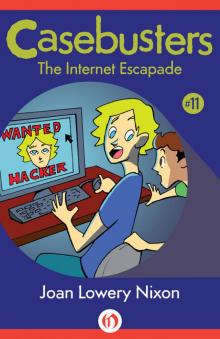 The Internet Escapade
The Internet Escapade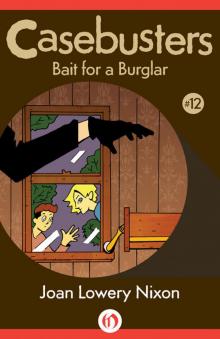 Bait for a Burglar
Bait for a Burglar A Place to Belong
A Place to Belong Nightmare
Nightmare Sabotage on the Set
Sabotage on the Set The Other Side of Dark
The Other Side of Dark Whispers from the Dead
Whispers from the Dead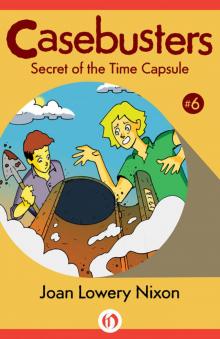 Secret of the Time Capsule
Secret of the Time Capsule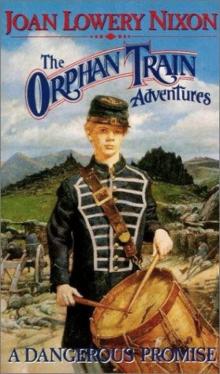 A Dangerous Promise
A Dangerous Promise Laugh Till You Cry
Laugh Till You Cry Spirit Seeker
Spirit Seeker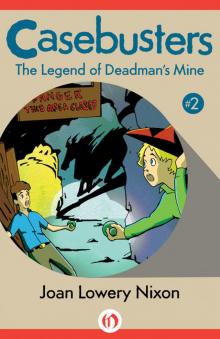 The Legend of Deadman's Mine
The Legend of Deadman's Mine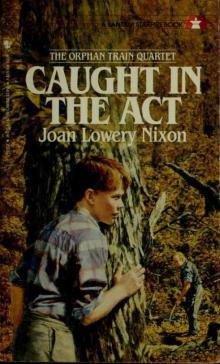 Caught in the Act
Caught in the Act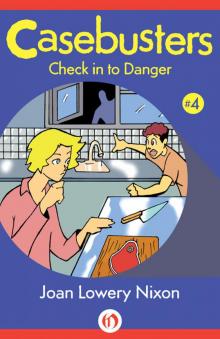 Check in to Danger
Check in to Danger Ellis Island: Three Novels
Ellis Island: Three Novels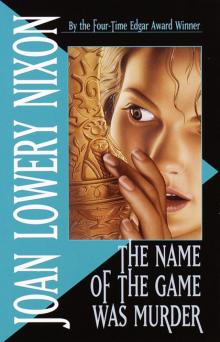 The Name of the Game Was Murder
The Name of the Game Was Murder The Haunting
The Haunting Lucy’s Wish
Lucy’s Wish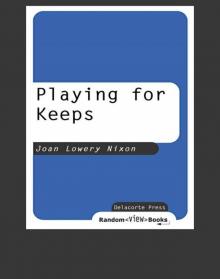 Playing for Keeps
Playing for Keeps A Family Apart
A Family Apart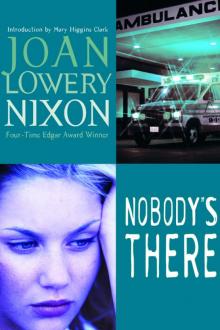 Nobody's There
Nobody's There Shadowmaker
Shadowmaker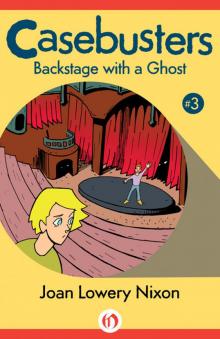 Backstage with a Ghost
Backstage with a Ghost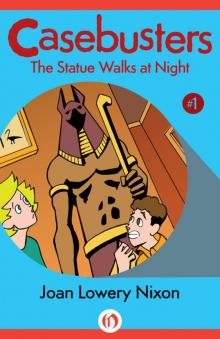 The Statue Walks at Night
The Statue Walks at Night Circle of Love
Circle of Love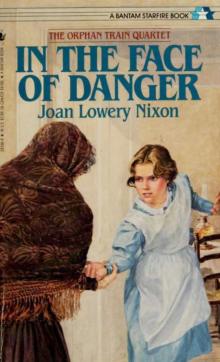 In the Face of Danger
In the Face of Danger Ghost Town
Ghost Town A Candidate for Murder
A Candidate for Murder The Weekend Was Murder
The Weekend Was Murder The Island of Dangerous Dreams
The Island of Dangerous Dreams The Ghosts of Now
The Ghosts of Now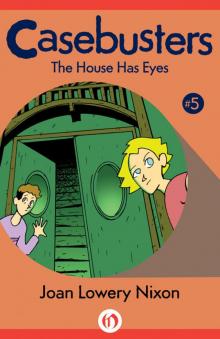 The House Has Eyes
The House Has Eyes The Dark and Deadly Pool
The Dark and Deadly Pool Keeping Secrets
Keeping Secrets Secret, Silent Screams
Secret, Silent Screams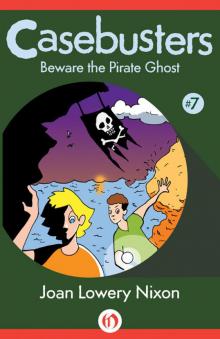 Beware the Pirate Ghost
Beware the Pirate Ghost Search for the Shadowman
Search for the Shadowman Haunted Island
Haunted Island